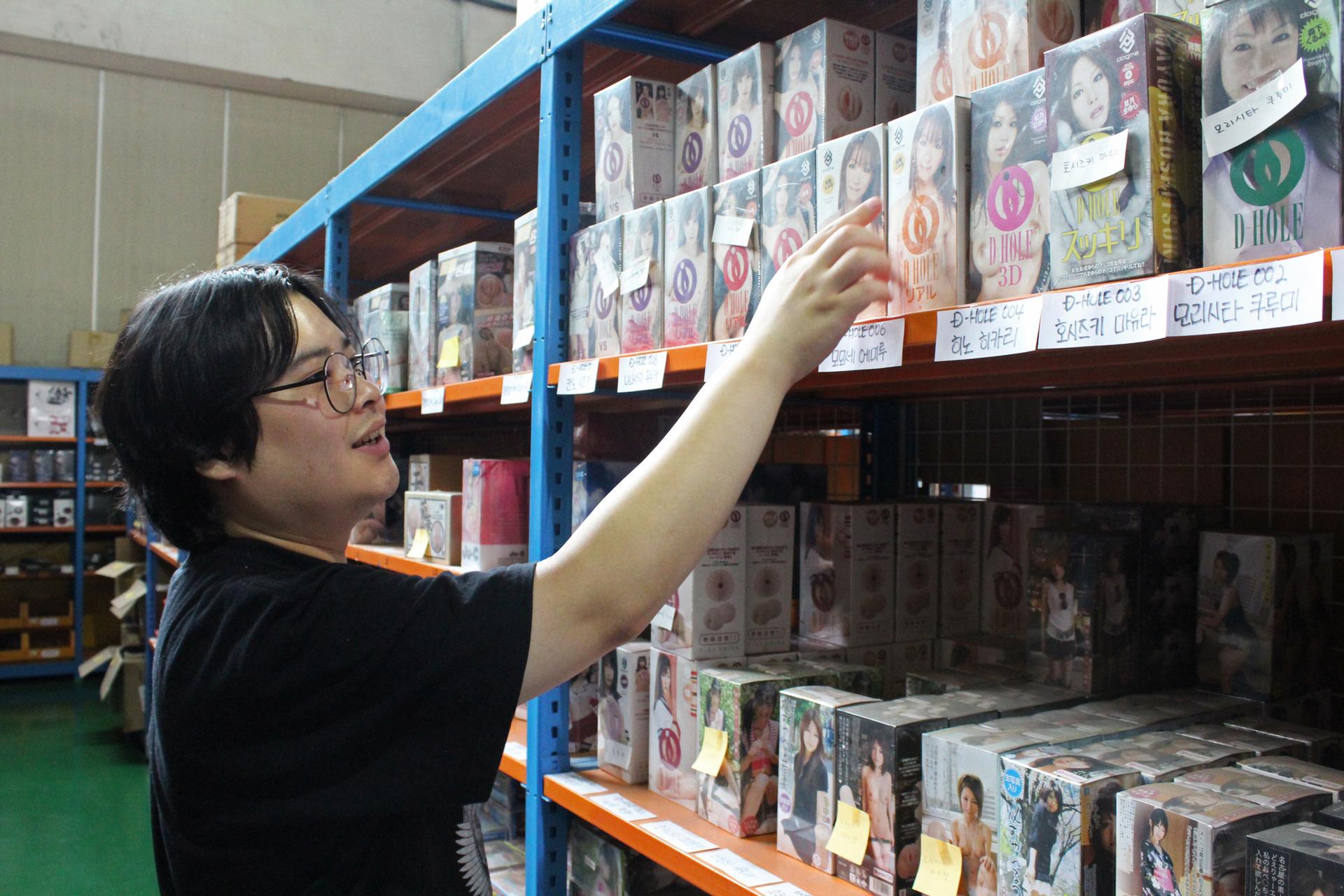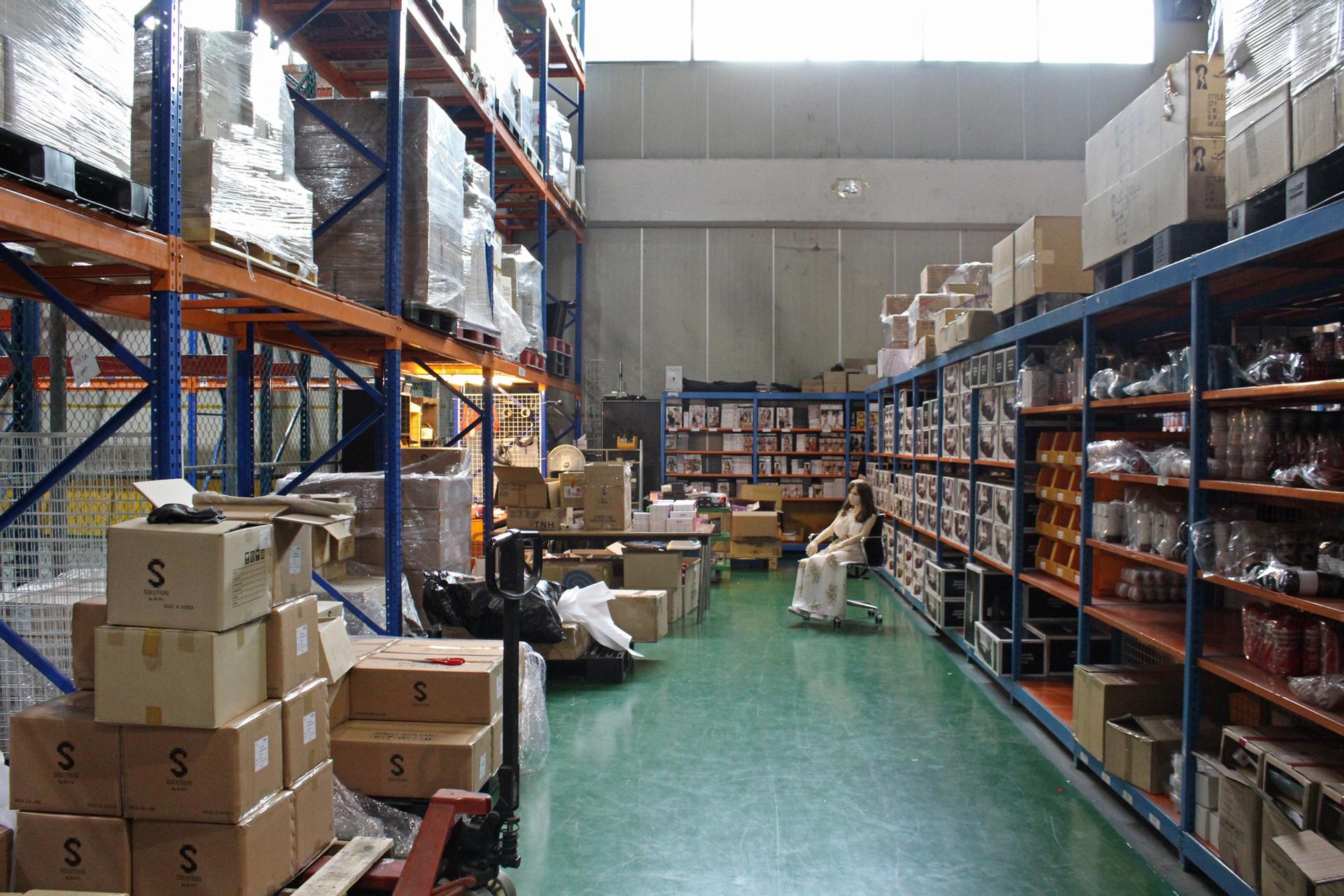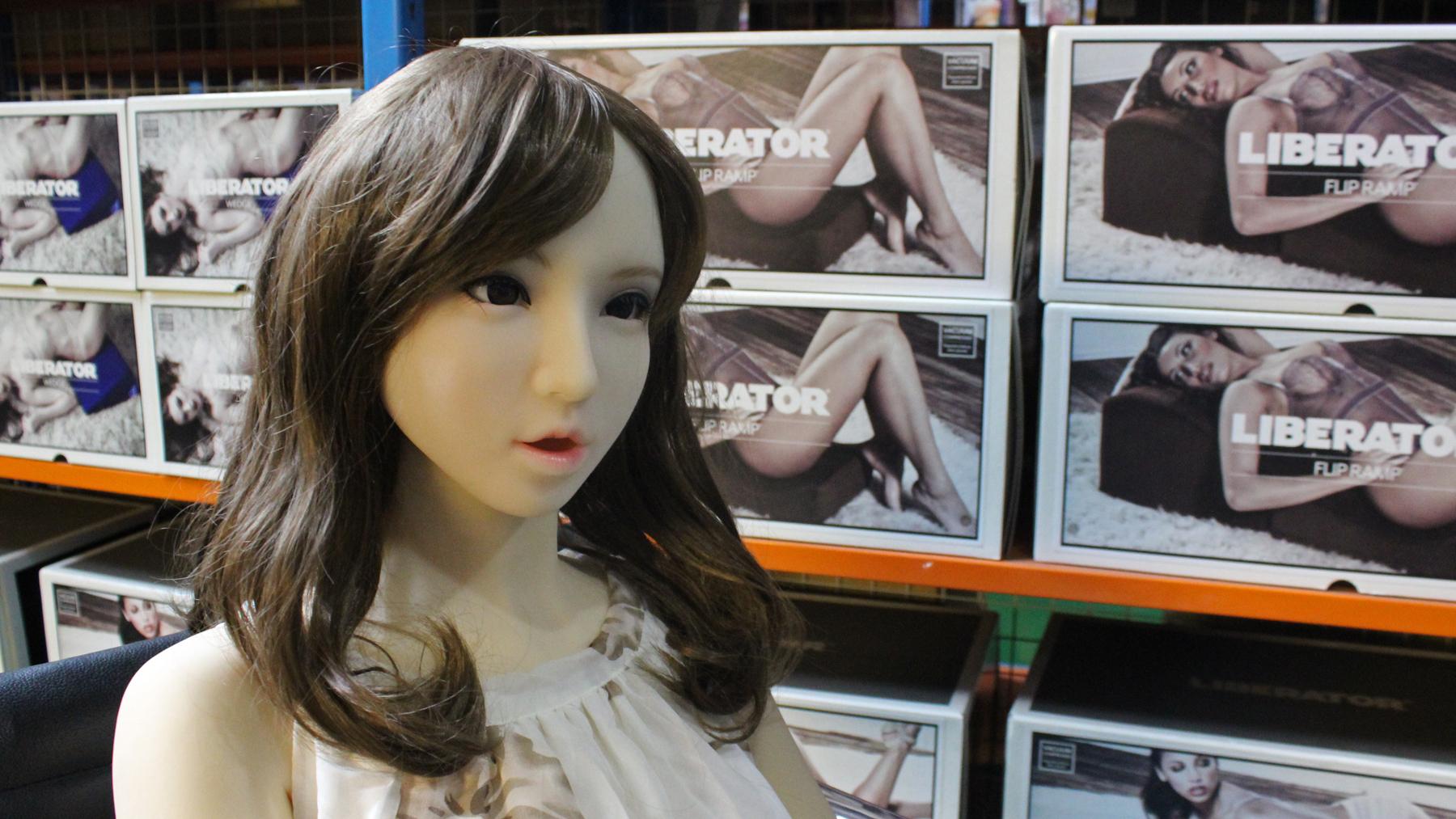South Korea’s sex doll industry stirs controversy with ‘life-size’ imports
A sex doll sits in a chair inside the warehouse of South Korean sex toy retailer Bururu.com and MS Harmony. The doll, which costs around $2,068 and comes with a custom Japanese face, is being sold by Bururu.com after the South Korean company won their dispute advocating for the legal importation of full-bodied sex dolls in June 2019.
Hidden in the depths of a warehouse near Seoul’s Gimpo International Airport, a one-room office is crammed with messy cubicles and stacks of paperwork. It looks like any other office, except for the unopened boxes of lube — and the ice cube tray with penis-shaped sockets — or the condom-shaped stuffed animal that smiles from the top shelf.
This is the office of Bururu.com, a South Korean sex toy company hellbent on changing the nation’s “restrictive” import regulations.
Their latest victory — fighting for the legal importation of “life-sized” sex dolls — has been stirring controversy ever since they won their casein June. So far, more than 260,000 South Koreans have signed a petition on the presidential office’s website demanding the government to reverse its decision, arguing that sex dolls objectify women and lead to more sex crimes.
Related: In a win for South Korea’s #MeToo movement, government gives more jail time to harassers
“The more fans and followers we attract, the more haters we’ll also get. Now that the imports are legalized, we’ve been getting a lot of inquiries from people interested in buying the dolls.”
“The more fans and followers we attract, the more haters we’ll also get,” said Lee Sang-jin, chief executive officer of Bururu.com. “Now that the imports are legalized, we’ve been getting a lot of inquiries from people interested in buying the dolls.”
Soft-spoken and nonchalant, Lee walked through the company’s towering shelves of inventory — everything from anal plugs to BDSM (bondage, dominance, sadism, masochism) restraints to silicone models of the female torso. He showed off one of the company’s imported dolls — a lower-end one from China with a custom Japanese face, priced at around $2,068.
Often called “real dolls” in South Korea, lifelike sex dolls imported by Bururu.com range from roughly 67 to 88 pounds and 5’ 1” to 5’ 6” in height. They can cost up to $10,000. Some men buy them for sex, Lee explained, but others dress them up and style their hair to live out their own gendered, feminine fantasies.
“Importing penis-shaped sex toys was illegal in Korea until 2008 and importing vagina-shaped sex toys was illegal until 2010. We fought the government for all of these, and we won.”
“These tend to be popular,” he said, pointing to boxes of prosthetic vaginas. “Importing penis-shaped sex toys was illegal in Korea until 2008 and importing vagina-shaped sex toys was illegal until 2010. We fought the government for all of these, and we won.”

Growing controversy
Sex toys have become increasingly mainstream among South Koreans in recent years. Shops selling vibrators for men and women draw steady crowds in university districts, and major South Korean retailers like Shinsaegae and E-mart have even begun selling sex toys last year.
But “real dolls” are not ordinary sex toys, according to their critics, and the South Korean government isn’t exactly seeking a sex revolution by legalizing the importation of them (the government blocked some 895 porn sites just last February). Some Twitter users are choosing to call these products “rape dolls” instead, and the original petitioners say they’ll give further rise to sex crimes, which have already become a hot-button topic in the wake of South Korea’s #MeToo movement.
“Do you think that using [sex dolls] will reduce sex crimes? On the contrary, those who are not satisfied with the motionless doll are likely to commit sex crimes against living women,” the online petition reads. “Don’t these dolls seem to seriously undermine human dignity?”
Truth be told, there are no studies about the effect of sex dolls on its users or any possible links between sex dolls and sex crimes, according to Kathleen Richardson, director of the Campaign Against Sex Robots and a professor of ethics and culture of robots and artificial intelligence at De Montfort University. However, Richardson believes that sex dolls are still likely to do harm.
“I think we can go one step further and say these people [sex doll consumers] are less likely to have empathy for women, they are less likely to be concerned about sexual assault and they are less likely to be concerned about women’s safety.”
“We live in a commercial world that has been set up for men, primarily, to access women’s and children’s bodies,” she said. “I think we can go one step further and say these people [sex doll consumers] are less likely to have empathy for women, they are less likely to be concerned about sexual assault and they are less likely to be concerned about women’s safety.”
“The very origin story of these dolls come from a very objectified viewpoint of women. For those reasons, I think it’s always going to be problematic,” Richardson added.
Some South Korean women’s groups are also against the dolls, especially if they tend to look like children. An official at the Korean Women’s Association United, who requested anonymity for fear of repercussions, said that sex dolls “are directly in line with misogyny.”
“It’s treating women as sexual objects. There are many concerns spreading from this,” she said. “One thing being discussed among lawyers here is that there is currently no law regarding doll customization. A man could customize the doll to have a friend’s face or a child’s face.”
Currently, South Korean lawmakers are trying to pass additional legislation that at least bans the sale and importation of child sex dolls.
Though Bururu.com does not sell full-bodied dolls shorter than roughly 5’ 1,” reports have surfaced of some companies selling dolls that are only 3’ 3” in height.

Legal loopholes
As far as the owners of Bururu.com see it, sex dolls are a personal choice — and they were already in South Korea anyway. Lee Sang-jin has chalked the backlash up to a “gender war,” adding that Bururu.com sells male-bodied sex dolls, too. Meanwhile, Lee Joon — the company’s founder — said that the lifting of restrictions on full-bodied sex dolls simply cleans up an arbitrary law and allows importers to be more transparent.
Before the law changed in June, companies were still allowed to import sex dolls that were isolated body parts, such as disembodied torsos, legs, buttocks or genitals. Only full-body sex dolls were blocked from being imported, and some of them were still being brought in and sold under the guise of “plastics or “mannequins,” he said. Meanwhile, full-bodied sex dolls designed and manufactured within South Korea were also legal.
Related: South Korea’s ‘No Japan’ boycott is new. But the wounds are old
“A lot of government officials just didn’t want to face backlash or take the responsibility for allowing full-bodied sex dolls. It was like the last thing they could hold onto,” Lee Joon said. “But a lot of people I met at fairs abroad, like American or Japanese dealers, would often ask me: ‘Isn’t it actually more grotesque to [have sex] using just human body parts? Aren’t full-bodied sex dolls just more normal?’ This was a longstanding double standard in Korea.”
Their moral justifications for the dolls, however, are still being challenged.
“As we have become a more and more developed country, I can feel the collective loneliness in our society [increases]. Everyone is lonely. … I don’t think everyone has to use sex dolls. It’s just one way of dealing with loneliness, and it can be a useful tool or even a friend for people … It’s a personal choice to own a sex doll, not a public matter.”
“As we have become a more and more developed country, I can feel the collective loneliness in our society [increases]. Everyone is lonely,” Lee Joon said. “I don’t think everyone hasto use sex dolls. It’s just one way of dealing with loneliness, and it can be a useful tool or even a friend for people … It’s a personal choice to own a sex doll, not a public matter.”
Richardson, the professor, responded with skepticism. “They would say that because they’ve got products and they want to sell them. People could take drugs privately, but it’s still socially irresponsible because it impacts social relationships with other people, doesn’t it?” she said. “That’s a very libertarian, individualistic and egocentric idea — that we live in these isolated worlds. But that’s not the reality, because we are a social species. These men [who use sex dolls] have to go out into the world at some point and interact with women.”
Lee Joon estimates that there are roughly 10 companies in South Korea currently importing and selling sex dolls. Despite their controversy, he sees “a very bright future” for the sale of these dolls, and looks forward to a future where robotic versions can communicate advanced emotions.
“I believe that sex must be pleasurable and that sex toys like these are just like legos for children: It’s all about fantasies and stimulating the imagination,” he said. “I’m just hoping for a society to accept this as a diversity of thought.”
